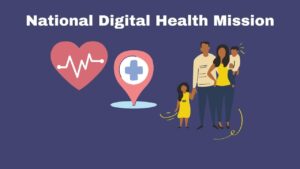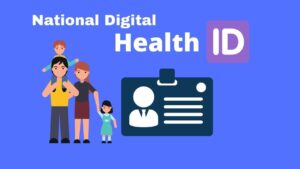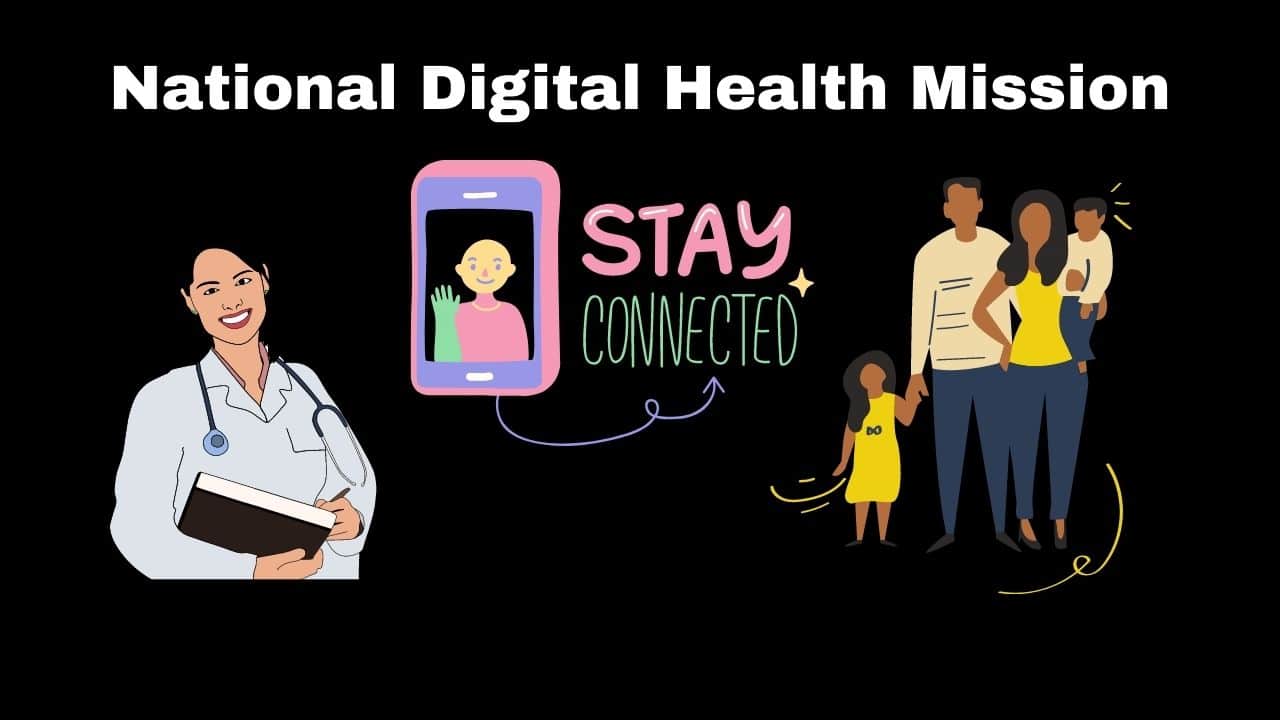Hi Everyone, Welcome To the CBSE Digital Edu Blog Website. Today We Are Going To Discuss A Interesting Topic about the National Digital Health Mission. CBSE Digital Edu provides all important information about National Health ID. All important topics covered in this article such as what is national digital health scheme, what is the aim of the national digital health mission, national digital health id, the advantages and challenges of the national digital health mission, and many more.
Healthcare has become one of the biggest sectors in India. This includes hospitals, medical equipment, medical tourism, medical insurance, etc. Healthcare providers are divided into public and private services.
Public health services, which include government services, exist in rural areas in the form of tertiary and secondary health facilities and primary health centers. Lack of adequate and quality health services in the public sector compels people to turn to private sector services which are very costly.
Various schemes have been launched by various State Governments to improve health services for different sections of the services which were not available to them till now, but still, various shortcomings exist.
Table of Contents
India to Officially roll out National Digital Health Mission
To address these gaps in the public health sector, the Prime Minister announced the launch of a National Digital Health Mission on the occasion of Independence Day.
This health campaign is completely based on technology and will play an important role in bringing a new revolution in the health sector in the country. Technology will also be incorporated to reduce the challenges faced in treatment. For this, a health ID card will be issued to every Indian.
According to Prime Minister Modi, ‘Every Indian will get a health ID card. Every time he/she visits a doctor or pharmacy, or lab, all the details will be registered into this health card. From doctor’s appointments to prescribed medicine, medical tests, when was done, every detail will be available in the health profile.
Why National Digital Health Id in News?
The Prime Minister of India (Narendra Modi) announced the launch of the National Digital Health Mission (NDHM) on the 74th Independence Day. It is a part of three digital announcements by PM Modi including a new cyber security policy and optical fiber connectivity in six lakh villages of the country.
What is National Digital Health Mission?
The National Digital Health Mission (NDHM) was proposed in the year 2018 by NITI Aayog, the government’s think tank for the national health stack. Under this, all the health-related information of the person will be kept in one place.
The NDHM program aligns with other government programs, including the Aadhaar Identification Program & the Ayushman Bharat Yojana health program.

Under the NDHM mission, every Indian will get a new Aadhaar-like health ID that will store the individual’s medical records including doctor’s visits, diseases, line of treatment, and medicines taken. The National Digital Health scheme will map the health of each citizen with a unique ID. It will also be integrated with the facility of using telemedicine, e-pharmacy, creating a National Health Registry.
| Mission | National Digital Heath Mission (NDHM) |
| Also called | Pradhan Mantri Digital Health Mision |
| Under | Central Government of India |
| Registration | NDHM Application Status 2021 |
| Official Website | ndhm.gov.in |
This ID will be necessary for any treatment from doctor’s appointment till hospitalization. The key feature of this mission is the technology part – it will leverage open digital systems to deliver high-quality healthcare for all. It will integrate various digital health services to form an ecosystem that can assimilate existing health information systems.
What is the aim of the national digital health mission?
The National Digital Health Mission aims to create a national digital health ecosystem by providing affordable and safe healthcare to the citizens of the country. This mission will also be a major achievement towards UN Sustainable Development Goal 3.8 of Universal Health Coverage.
Key Pointers of the NDHM
Following are the 6 key points of NDHM through which citizens will have access to timely, safe, and affordable health care:
- Health ID
- DigiDoctor
- Health Facility Registry
- Personal Health Records
- e-Pharmacy
- Telemedicine
What is National Digital Health Id?

A National Digital Health ID is a unique ID that will be assigned to each individual who will identify the individual with the patient’s consent, authenticate them and keep their health records for their medical history. This will allow the seamless flow of health information across different systems for better service delivery to the patient. A health ID will be generated using the basic details and mobile or Aadhaar number which will be unique to that individual.
In addition to the patient health information repository, the program will also include:
Digi Doctor: It will be a comprehensive data gathering platform of all doctors who are currently practicing or teaching modern or traditional systems of medicine. This will allow doctors to connect with India’s digital health ecosystem.
Health Facility Registry: This is a comprehensive record of health facilities across the country. This would include both public and private health facilities including hospitals, clinics, diagnostics, laboratories, pharmacies, etc.
Electronic Medical Records: This will be a digital version of the patient’s treatment history from a single facility. Health information recorded in a facility will be stored locally at the establishment where the patient was registered. This information will be linked to the patient’s health ID.
How the Health ID card is created?
The Health ID card is created with the help of the details like the Aadhaar and the mobile number of an individual, generating a unique ID for every individual. Also, the Health ID card is voluntary and a person will be given the treatment even if he doesn’t want to have a Health ID card.
The National Health Authority (NHA), Ministry of Health and Family Welfare has given the approval to implement the National Digital Health Mission in the country.
According to the Union Minister of Health and Family Welfare, Dr. Harsh Vardhan, The scheme is rolled out through a pilot launch in the Union Territories of Chandigarh, Ladakh, Dadra & Nagar Haveli and Daman and Diu, Puducherry, Andaman & Nicobar Islands, and Lakshadweep. With the initial learning in the Union Territories, the scheme will be rolled out in the States as well.
Deficiencies of Healthcare System in India
Poor Primary Health Services: The scope of the current primary health care model is limited. The services provided in these primary centers are only a few services related to childcare, womencare, maternity, and national health and schemes. These account for a very small proportion of the essential services that people demand their own welfare and well-being and to prevent morbidity. Thus, there is no provision for services such as hypertension, heart disease, adolescent health, mental health, disability, old age health, and early cancer detection.
Low Workforce in Healthcare: India’s health force is characterized by the diversity of healthcare workers in the field of alternative systems of medicine such as Allopathy, Ayurveda, Homeopathy, Unani, and Siddha.
Low Priority to Public Health: Keeping communities healthy by preventing disease and promoting health and wellness has historically been a low priority in India. Of all current expenditures on health, preventive care accounts for only 6.7%, while treatment of people comprises more expenditure as it includes other expenses such as pharmaceuticals, other medical goods, and transportation.
Limited Training: In most states, public health management positions are occupied by doctors, who are trained primarily in the provision of curative services, or by generalist civil servants. They have limited public health training in understanding cause and effect between risk factors and diseases, as well as disciplines such as epidemiology, biostatistics, behavioral science, and health services management. Hospitals in rural areas are run by physicians who have little expertise in the management of health facilities.
How will these digital initiatives improve healthcare in India?
The technology-based initiative will revolutionize the set of public as well as private healthcare systems in India. It will provide the following benefits for the healthcare system.
- Better quality of health data is going to be most beneficial to the policymakers which will enable the government to formulate better policies for a particular sector as well. It can be used to monitor India’s health care both geographically and demographically.
- Digitization of medically important information will help doctors to diagnose the patient easily. The doctor will have access to current and past diagnoses, current & past illnesses, medical reports, prescriptions, discharge summaries, etc. This will reduce the time involved in early diagnosis and provide better quality health services to the patient.
- Preventive health care will be strengthened as the government will be in a better position to formulate policies and programs to establish, operate and monitor primary health centers for preventive health needs of citizens if they have a comprehensive database of prevalent diseases.
- With the help of teleconsultation, e-pharmacy, online appointments, etc., patients will be able to access health services remotely. This will reduce the disparity between rural and urban in the availability of health services. Patients will be able to access this information on the mobile app.
Document Required for National Digital Health Mission
- Mobile number
- Aadhar card
- Health reports
- Residential certificate
How to Apply for the NDHM scheme?
If a citizen of our country wants to apply for the scheme, follow the step given below:
Step I: Visit the official website of the National Digital Health Mission at ndhm.gov.in
Step II: On the homepage download the NDHM Id app. You can also download it from the Google play store.
Step III: After clicking the app, click on the registration form page that is displayed on your mobile/laptop screen.
Step IV: Enter your mobile number & OTP (One Time Password) will be generated. Enter OTP & your name.
Step V: Enter all the required information regarding your date of birth, gender, name, father’s name, and more.
Step VI: After filling in all the details then click on the “Submit” button.
Way Forward
All these high and tall promises cannot be met without addressing patient privacy and data concerns. There has been little movement in India’s data protection infrastructure. Medical health data is very important. If it is not handled carefully, it will invade privacy and other related issues with patients.
In addition, the government would need to encourage hospitals, clinics, patients, etc. to adopt new technologies as it would require significant investment in the technology setup and operation of the digital system. There should be standardization in all systems so that it is not confusing for the patient as well as the service provider.
The system will also need to be error-free as the updating of data on the server involves critical errors which in turn can affect the health of the patient. In addition, the government will also need to regulate the use of personal data by private companies so that it is not misused. Thus, addressing all these concerns can bring significant benefits to healthcare in India and to the health of Indians.
I hope you like this post about the National Digital Health Mission PDF. If you want to ask any queries regarding the National Digital Health Mission UPSC, then message us in the comment section, and we will reply to you soon.
